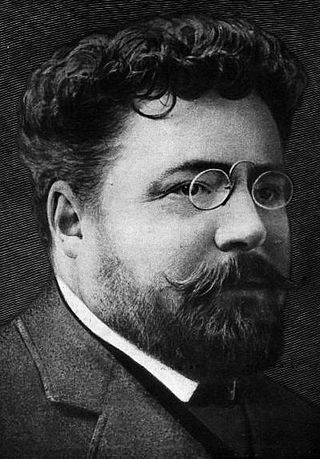Other
- The Man Who Laughs (opera), an opera by Airat Ichmouratov
- Batman: The Man Who Laughs , a 2005 graphic novel
- "The Man Who Laughs", a song by Rob Zombie from the 2010 album Hellbilly Deluxe 2
The Man Who Laughs is a romantic novel by Victor Hugo originally published in June 1869 under the French title L'homme qui rit.
The Man Who Laughs may also refer to:

Victor-Marie Hugo, vicomte Hugo was a French Romantic writer and politician. During a literary career that spanned more than sixty years, he wrote in a variety of genres and forms.

Gaston Louis Alfred Leroux was a French journalist and author of detective fiction.

Claude Farrère, pseudonym of Frédéric-Charles Bargone, was a French Navy officer and writer. Many of his novels are based in exotic locations such as Istanbul, Saigon, or Nagasaki.
Laughing Man may refer to:

The Man Who Laughs is a novel by Victor Hugo, originally published in April 1869 under the French title L'Homme qui rit. It takes place in England beginning in 1690 and extends into the early 18th-century reign of Queen Anne. It depicts England's royalty and aristocracy of the time as cruel and power-hungry. Hugo intended parallels with the France of Louis-Philippe and the Régence.

Le roi s'amuse is a French play in five acts written by Victor Hugo. First performed on 22 November 1832 but banned by the government after one evening, the play was used for Giuseppe Verdi's 1851 opera Rigoletto.

Les Casquets or (The) Casquets is a group of rocks eight miles (13 km) northwest of Alderney in the Channel Islands; they are administered by the Bailiwick of Guernsey. The rocks are part of an underwater sandstone ridge. Other parts which emerge above the water are the islets of Burhou and Ortac. Little vegetation grows on them.

The Laughing Cow is a brand of processed cheese products made by Fromageries Bel since 1921. The name refers in particular to the brand's most popular product, the spreadable wedge.
Maurice Renard was a French writer.
"The Laughing Man" is a short story by J. D. Salinger, published originally in The New Yorker on March 19, 1949; and also in Salinger's short story collection Nine Stories. It largely takes the structure of a story within a story and is thematically occupied with the relationship between narrative and narrator, and the end of youth. The story is inspired by the 1869 Victor Hugo novel of the same name: The Man Who Laughs.
The Laughing Policeman is a mystery novel by the Swedish writing duo Maj Sjöwall and Per Wahlöö, originally published in Sweden in 1968 as Den skrattande polisen and translated into English in 1970. It is the fourth of ten novels featuring police detective Martin Beck.
The Man in the Iron Mask was an unidentified prisoner of state in France under the reign of Louis XIV.

Pierre-Eugène Veber was a French playwright and writer.

The Man Who Laughs is a 1928 American synchronized sound romantic drama film directed by the German Expressionist filmmaker Paul Leni. While the film has no audible dialog, it was released with a synchronized musical score with sound effects using both sound-on-disc and sound-on-film processes. The film is an adaptation of Victor Hugo's 1869 novel of the same name, and stars Mary Philbin as the blind Dea and Conrad Veidt as Gwynplaine. The film is known for the grotesque grin on the character Gwynplaine's face, which often leads it to be classified as a horror film. Film critic Roger Ebert stated "The Man Who Laughs is a melodrama, at times even a swashbuckler, but so steeped in expressionist gloom that it plays like a horror film."

Glowing Eyes is a 2002 French drama film directed by and starring Jacques Nolot. It was screened in the Un Certain Regard section at the 2002 Cannes Film Festival. The film has been cited as a favorite by filmmaker John Waters, who presented it as his annual selection within the 2005 Maryland Film Festival and selected it for his 2006 anthology series John Waters Presents Movies That Will Corrupt You.
Walking Man is a 1974 album by James Taylor.

The Man Who Returns from Afar is a 1950 French thriller film directed by Jean Castanier and starring Annabella, Paul Bernard and María Casares. It is based on the 1916 novel of the same title by Gaston Leroux.

The Man Who Laughs is a 2012 French/Czech romantic musical drama film produced by EuropaCorp and based on the 1869 eponymous novel by Victor Hugo.
Xavier Depraz, néXavier Marcel Delaruelle was a French opera singer and actor.

The Man Who Laughs is an opera in two acts with a prologue by Canadian composer Airat Ichmouratov, to a libretto in French by poet Bertrand Laverdure, adapted from the eponymous novel by Victor Hugo. Commissioned by Festival Classica, it was premiered in concert version, conducted by Airat Ichmouratov on May 31, 2023, in Montreal, Canada.